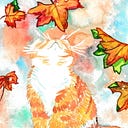Calan Gaeaf The Welsh Halloween
When I lived in Wales I celebrated Calan Gaeaf with my friends. Calan Gaeaf is Welsh and it is derived from Nos Calan Gaeaf which means the night of the spirits.
Calan Gaeaf has been traditionally celebrated in Wales during the night between the last day of October and the first of November. It is a very similar festival to Samhain in Ireland and Samhuin in Scotland, Kekri in Finland, Mardipäev in Estonia and Velines in Lithuania etc.
There are many interesting and fascinating beliefs and customs connected to Calan Gaeaf. One of the most important traditions was bonfires and they were known as Coelcerth. According to one custom, people piled rocks around the fire and carved their names into the rocks. If the rock was gone in the next morning, the person whose name was in the missing rock would pass away in the coming year.
It was believed that the night between the last of October and the first of November was limbo, the time when the veil between the living and the death was open. The Welsh word for November Tachwedd means slaughter. November was a month when animals were slaughtered and the meat was restored for the upcoming winter.
Mumming and masquerades were a big part of Calan Gaeaf. Many people wore masks so that the evil spirits would not recognise them. There were plays organised by theatre and pantomime groups. Making tricks and pranks was also part of Calan Gaeaf. It was believed that mimicking the spirits would bring good luck for the coming year. During medieval times, people gave so-called soul-cakes to each other. Soul-cake tradition originated from French monasteries where during the day of St. Martin cakes were given to the poor. In Wales, families baked lots of soul-cakes and gave them to friends and neighbours. When a person receives a soul-cake they are ought to think about a passed away person. Hence the name soul-cakes.
Soul-cakes were often given to the mummers, who often were disguised children and teen-agers. Later on, soul-cakes were replaced by sweets and money.
Celebration of Calan Gaeaf decreased in the 19th and 20th centuries when the state claimed most of the land and during the time of the industrial revolution, the majority of the people moved from the countryside to cities. Nowadays most Welsh people who celebrate Calan Gaeaf are pagans/spiritual folk and Halloween has become quite popular in the UK as well within recent years.
If you enjoy reading my content, consider subscribing to my feed. Also, if you are not a Medium member and you would like to gain unlimited access to the platform, consider using my referral link right here to sign up. It’s $5 a month and you get unlimited access to my articles and many others like mine. Thanks
